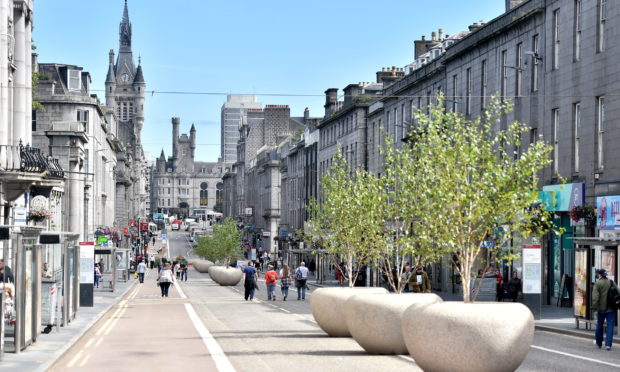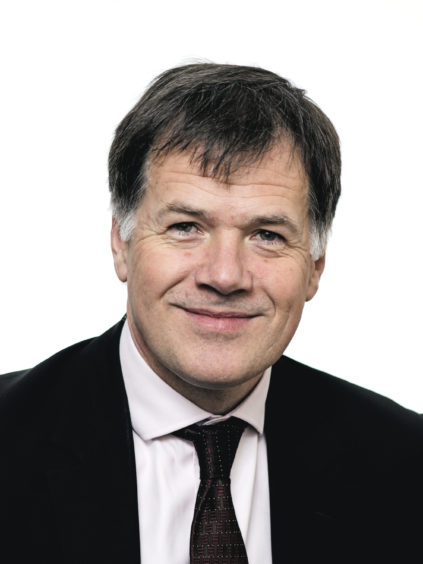In the depths of lockdown, driving to work was an eerie experience.
Arriving at the junction with the trunk road was strange, as rather than waiting for a gap in the traffic I could pull right out because, while the rest of the population was largely confined to their homes, I was an essential worker still on my short morning commute.
When not working, like most folk, I was spending far more time in my garden and it was noticeable that there was no background hum of traffic but a more vivid soundtrack from nature.
Skylarks were singing and the blackbirds’ liquid song was clear in the air. There were no aeroplane trails in the sky.
It was as if the Earth was sighing with relief that the human onslaught had been turned down.
Human behaviour changed too. The empty trunk road removed a hazardous crossing for pedestrians and I could hear the chat as families took the chance to walk and cycle along the quiet country road past my house.
People were out and about exploring the neglected corners within five miles of home. Bike shops sold out of new bikes, old bikes were dusted off and tyres pumped up.
Roads that were previously seen as too dangerous saw a steady stream of cyclists out to get some fresh air and respite from the monotony of lockdown.
At the health centre, work also changed.
Routine appointments have been replaced by phone calls and video consultations and for once, there is space in the car park.
I was in the habit of making regular trips to Edinburgh, Glasgow and London to attend meetings and I have learned that it is possible to do all of them by Zoom, phone, email or some other means. Or not at all.
Was this what a low carbon future might look like? The future that we know we should be embracing to save our planet?
Before Covid-19, climate change was the threat that politicians were being forced to face up to.
Now they, like us, have more immediate concerns, such as being mindful of our mental health and the new rules of social distancing, but this other global threat has not gone away.
Now I am back to waiting my turn at the road junction, sometimes for ages, for a gap in the traffic to pull out and this is even before the schools have gone back and the tourist season not yet in full swing.
The priority is trying to return to normal and the risk is that any environmental benefits of the last four months will be lost.
The number of cyclists is still up but I know of someone who is passionate about the environment who enthusiastically took up cycling when the roads were quiet, only to have a nasty bike crash after the traffic surged back and is now having second thoughts about whether this new routine is worth risking her life for.
Surely this should be a time to build the infrastructure to make cycling as routine as it is in the Netherlands and elsewhere?
It’s the same for pedestrians. Crossing main roads, like the one close to my house, is often a thrill-ride of risk and reward for those on foot, however cautious.
The main road is a wide, straight hill, about two miles long and it’s hard to know how fast approaching vehicles are going, so we have learned not only patience but also, perhaps during lockdown, complacency.
“Watch the junction!” is a mantra which we have had to revive now that it’s busy again.
I am concerned that walking for leisure is going to diminish again, as we return to our cars.
The pandemic may have made things worse for the environment as travelling by car must surely be seen not only as convenient but also, as having the lowest risk of virus infection.
And who can blame people for trying to stay safe?
Why expose yourself to possible infection on public transport, or risk your life on a bike on a busy highway when you can cocoon yourself and your children in the protective bubble of your own vehicle?
It’s a no-brainer for those lucky enough to have the choice.
The threat from Covid-19 is still immediate and will require further sacrifices and difficult decisions to overcome.
Right now, global warming feels much less scary. We had a glimpse of what a low carbon economy would be like but that is not how many want, or are able, to live.
The roads were quiet and safe, but we lost the ability to travel far and so found ourselves separated from our colleagues, friends and loved ones.
I hope we can find the energy and commitment we will need to tackle the challenges of climate change in a way that sticks.
Right now, it seems that reversing climate change is once more on hold. Any benefit to the environment now seems to have been a by-product of lockdown rather than something hard won.
Dr Miles Mack is a GP in the Highlands and the former chairman of the Royal College of General Practitioners Scotland

